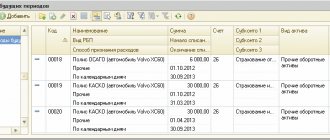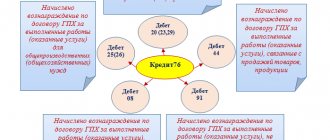Insurance premium and types of insurance
The insurance premium is a fee for insurance (Article 954 of the Civil Code of the Russian Federation), which the policyholder (a legal entity or individual who decides to insure life, health, property, liability or risks) pays to the insurer (a legal entity authorized to conduct insurance activities) upon concluding an agreement insurance.
Insurance occurs in relation to the occurrence of any specific cases, can be carried out both in the interests of the policyholder himself and in favor of third parties and can be either mandatory (provided for by one of the laws of the Russian Federation) or voluntary.
The amount of the insurance premium is indicated in the insurance contract and is determined according to the tariffs developed by the insurer itself or the insurance supervisory authorities.
There are many types of insurance:
- personal - related to life and health;
- property, designed to reduce losses from loss, shortage or damage to any property;
- various types of risks - such as, for example, technical, financial (including those associated with non-receipt of payment from buyers or goods from suppliers), legal;
- liability - for example, civil, professional, developer, borrower.
If you do not know how to reflect the insurance premium under the MTPL agreement, use the recommendations from ConsultantPlus. Get trial access to the system and move on to the Ready-made solution. It's free.
DSAGO
In addition to compulsory insurance, the car owner can insure his civil liability under an additional contract. Such an agreement is concluded if the policyholder considers the insurance payment provided for by the MTPL agreement to be insufficient to compensate for possible damage to the injured party (clause 5 of Article 4 of the Law of April 25, 2002 No. 40-FZ). A DSAGO policy purchased for a fee allows you to increase the maximum amount that the insurer will compensate the injured party in the event of harm. Thus, the DSAGO policy complements the compulsory insurance in case of larger damage. The maximum amounts of insurance compensation under the DSAGO policy are set by each insurer independently.
Payers of premiums under an insurance contract
The insurance premium is paid by the person who entered into an agreement with the insurer. This person may be:
- employer - in relation to contracts of compulsory or voluntary personal insurance of employees;
- owner of property or a person disposing of it with the right of operational management (economic management);
- the person responsible for the safety of the property, including the tenant or carrier;
- a person who may face risks of certain losses due to circumstances beyond his control;
- a person who, due to his actions or, conversely, inaction, can cause damage to third parties.
In relation to the same item, insurance contracts with different insured parties may be in place at the same time: for example, the seller who dispatches it to the buyer and the carrier who carries out the actual delivery can insure property liability in relation to the same consignment of goods.
Property actually used under a lease agreement may be insured:
- Voluntarily: for example, by the tenant or landlord of the property. It is advisable to include a clause about who will insure the property in the text of the lease agreement. This will be important, for example, for payers of the simplified tax system working with the object “income minus expenses”, who will not be able to take into account the costs of voluntary insurance in expenses when calculating the single tax (subclause 7, paragraph 1, article 346.16 of the Tax Code of the Russian Federation, letter from the Ministry of Finance of the Russian Federation dated May 20, 2009 No. 03-11-09/179).
- Mandatory: for example, in relation to rented (leasing) vehicles, when the transport is registered in the name of the lessee (lessee) for the duration of the contract. The presence of an MTPL policy issued for this vehicle by the insured is mandatory when registering the vehicle with the State Traffic Safety Inspectorate.
Accounting for construction and installation risks
Violations, even minor ones, in the construction industry can cause the collapse of elements and even the entire building. To reduce the cost of their restoration, contract agreements are being built. installation risks (DS, construction and installation works). For the contracting firm, costs are the costs of the work performed under the agreement. Construction and installation work insurance is carried out as a police department.
Example 3. An enterprise transfers money to the insurer under an agreement drawn up for a year, then the funds are included in the RBP, and then for the period of validity of the insurance policy they must be written off as expenses.
Payment of insurance premium and its return by the insurer
The effective date of the insurance contract may be indicated in the contract itself. If it is not there, the contract will come into force from the date of payment of the insurance premium (clause 1 of Article 957 of the Civil Code of the Russian Federation). It is allowed that the insurance premium can be paid in installments, but the start date of the contract, if there is no indication of it in the text of this document, will coincide with the day of the first payment.
Thus, payment of the premium in relation to the date of entry into force of the contract can be made:
- on this date;
- before this date;
- after this date.
For late payment of the next installment, the contract may provide for penalties. If the next part of the payment is not paid, the insurance contract will terminate upon the expiration of the period corresponding to the amount of the insurance premium actually paid.
Before the expiration of the contract, situations of its early termination may arise related to the loss of property or termination of activities by the insured (clause 1 of Article 958 of the Civil Code of the Russian Federation). In this case, the insurer must return to the policyholder that part of the insurance premium that corresponds to the period of unclaimed insurance contract. A similar condition for the return of the premium may be provided for in the contract for the situation of the policyholder’s voluntary refusal of this document.
How to reflect in accounting the return of the insurance premium in case of early termination of the CASCO agreement, ConsultantPlus experts told. If you don't have access to the system, get a free trial online.
For more information about when the insurer returns the premium, read the article “Insurance premium is...”.
Documenting
An organization needs to track the validity periods of MTPL policies (DSAGO, CASCO) and their movement (transfer to the driver, return, write-off). For such control, you can create a log of OSAGO policies (DSAGO, CASCO). There is no standard form for this document, so the organization has the right to develop it independently.
Keep contracts (policies) for compulsory motor liability insurance, motor insurance policy, motor insurance policy, and CASCO insurance, as well as registers for their accounting for at least five years. This follows from the provisions of Part 1 of Article 29 of the Law of December 6, 2011 No. 402-FZ and the list approved by Order of the Ministry of Culture of Russia of August 25, 2010 No. 558.
In addition, if more than three years have passed since the date of manufacture of the car, then in order to conclude a compulsory motor liability insurance agreement it is necessary to undergo a technical inspection and obtain a diagnostic card.
Insurance premium settlement account
To account for settlements under contracts of all types of insurance in which a legal entity acts as an insured (except for mandatory social, pension and medical, accounted for in account 69), the chart of accounts (Order of the Ministry of Finance of the Russian Federation dated October 31, 2000 No. 94n) provides a separate subaccount for account 76: 76 -1 “Calculations for property and personal insurance.”
Analytics on this sub-account is organized in relation to each insurer and each contract concluded with this insurer.
Payment of the insurance premium under the insurance contract will be reflected in the accounting entry as follows: Dt 76-1 Kt 51 (51, 71).
The posting will be reversed when returning part of the premium under an early terminated contract: Dt 51 (50) Kt 76-1.
VAT will not appear in the calculations, since insurance services are exempt from this tax (subclause 7, clause 3, article 149 of the Tax Code of the Russian Federation).
Accounting for insurance costs in accounting will begin from the day the insurance contract comes into force. The procedure for accounting for insurance costs is not regulated by accounting legislation. Therefore, they can be expensed either at a time or over the life of the contract. PBU 10/99 allows you to do both (Order of the Ministry of Finance of the Russian Federation dated May 6, 1999 No. 33n). The decision about this should be written down in the accounting policy. However, in any case, only the amount of the insurance premium that will actually be paid can be included in the costs. Therefore, if the premium is paid in installments and the accounting policy involves writing it off as expenses during the term of the contract, the paid amount will need to be distributed not over the entire term of the contract, but only for the period that was actually paid.
In the credit part of the entry for the insurance premium, reflecting its acceptance for accounting, in any case, subaccount 76-1 will be indicated. In the case of a one-time write-off, the debit part will indicate cost (or other expenses) accounts. But for the method of debiting during the period, the account numbers of the debit part of this entry may have options. In addition, with each write-off method (at a time or for a period), there will be differences between the accounting (BU) and tax (TA) accounting data, depending on the discrepancy:
- methods of attribution to expenses acceptable for accounting and financial accounting;
- amounts that can be taken into account in expenses according to the rules of accounting and accounting;
- moments of accounting in expenses according to the requirements of accounting and accounting regulations.
The discrepancies between the BU and NU rules for insurance expenses are as follows:
- The accounting system allows for their write-off both at one time and over a period. In NU, a one-time write-off is possible only for an agreement valid within one reporting period for income tax, and a longer period of validity requires mandatory distribution of expenses (clause 6 of Article 272 of the Tax Code of the Russian Federation).
- In accounting, expenses are always recognized in their full amount, and for acceptance into the NU the following restrictions apply: within the limits of legally established tariffs for compulsory property insurance (clause 2 of article 263 of the Tax Code of the Russian Federation);
- no more than 15,000 rubles. per year per employee under voluntary personal life or health insurance contracts concluded for a period of at least a year (clause 16 of Article 255 of the Tax Code of the Russian Federation);
- no more than 12% of the wage fund for long-term (more than 5 years) life insurance contracts (clause 16 of Article 255 of the Tax Code of the Russian Federation);
- no more than 6% of the wage fund under voluntary health insurance contracts concluded for a period of at least a year (clause 16 of Article 255 of the Tax Code of the Russian Federation).
The emergence of differences between accounting accounting and NU for a number of taxpayers entails the obligation to apply PBU 18/02. To whom exactly does this apply, read the material “PBU 18/02 - who should apply and who should not?” .
Accounting for insurance premiums at a time
Accounting rules (clauses 16–18 of PBU 10/99) allow for the possibility of one-time recognition of insurance expenses on the date the insurance contract comes into force. Logically, this is explained by the fact that at this moment the insurer should not have any debt to the policyholder: the insurance premium is payment for concluding an insurance contract, and since the contract is concluded, the insurer’s obligations as of the date of its conclusion are fulfilled.
The accounting entry here will be like this: Dt 20 (23, 25, 26, 44, 91) Kt 76-1.
Tax consequences:
- If the agreement is short-term (no more than one reporting period for income tax), the entire agreement falls within this reporting period, the beginning of the agreement according to the rules of both accounting falls on the same period, there are no discrepancies in the amount of amounts accepted for accounting, then the differences between the accounting accounting data and NU will not arise.
- Discrepancies in accounting and accounting records will appear if one of the following points occurs: the contract period extends beyond one reporting period and for accounting accounting, accordingly, costs must be accounted for over more than one period;
- for NU, restrictions are triggered for acceptance into costs;
- do not coincide and fall on different reporting periods, the start date of the insurance contract for BU and NU.
A discrepancy between the accounting rules in accounting and national accounting can lead to both the formation of expenses that are not accepted for the purposes of calculating income tax, and to discrepancies in the timing of accounting for these expenses. In the latter case, there is usually an entry for deferred tax assets: Dt 09 Kt 68, corresponding to the earlier recognition of insurance expenses in accounting expenses. As the amounts are accepted into the NU, these differences will be leveled out, and the tax on them will be written off: Dt 68 Kt 09.
Posting Dt 68 Kt 77 is less common, but can also occur if in the NU the agreement begins to be valid earlier than in the BU. Smoothing out the differences between accounts in this case will be reflected by posting Dt 77 Kt 68.
Thus, the one-time recognition of expenses in accounting for most insurance contracts will lead to the formation of differences between accounting and accounting.
Accounting for insurance premiums during the term of the contract
The use of the second method, which allows for the use in accounting of expenses to be written off by justifying their distribution between reporting periods, helps to smooth out the differences that arise between accounting periods and accounting periods (clause 19 of PBU 10/99). This method can be used in two ways:
- The paid premium is regarded as a receivable (which is allowed by clause 16 of PBU 10/99, and an additional motive is the possibility of returning part of the premium upon early termination of the insurance contract) and is included in expenses as insurance services are recognized as completed. That is, every month the part of the premium due for this month is written off directly from subaccount 76-1 to expenses: Dt 20 (23, 25, 26, 44, 91) Kt 76-1.
- The part of the premium not included in expenses in the reporting period in which the contract begins is considered deferred expenses. This allows you to do this in clause 65 of the PBU on accounting and accounting (order of the Ministry of Finance of the Russian Federation dated July 29, 1998 No. 34n) and clarifications of the Ministry of Finance of the Russian Federation (letter dated January 12, 2012 No. 07-02-06/5). That is, in the month the contract begins, the part of the premium attributable to this month will be written off as expenses: Dt 20 (23, 25, 26, 44, 91) Kt 76-1, and the remainder will be taken into account as deferred expenses: Dt 97 Kt 76-1. In the future, the amount of insurance expenses corresponding to this month will be written off monthly as expenses using the entry Dt 20 (23, 25, 26, 44, 91) Kt 97.
For the majority of insurance contracts, the use of any of the two indicated methods will lead to the absence of differences between their accounting in accounting and accounting records. Discrepancies may arise if:
- for NU, restrictions are triggered to be accepted into costs - in this case, both temporary differences and permanent ones may arise;
- do not coincide and fall on different reporting periods, the start dates of the insurance contract for BU and NU - this leads to the formation of temporary differences that disappear upon completion of the contract. One example of such differences is the issuance of monthly insurance contracts for the volume of cargo actually shipped per month, with invoicing and payment in the month following the month of dispatch. Here, in the accounting system, the expense is recognized earlier than in the tax accounting system, and for months located on the border of the reporting periods for income tax, the difference must be taken into account when calculating this tax:
- Dt 09 Kt 68 - in the month of shipment;
- Dt 68 Kt 09 - in the month of payment of the insurance premium.
Features of accounting for payments in SRO
Considering the features of accounting for insurance premiums, it is logical to mention payments to the SRO (self-regulatory organization), membership in which for a number of taxpayers is a mandatory condition for carrying out their activities.
The obligatory nature of contributions to the SRO necessitates their one-time accounting in the NU on the date of payment. And for accounting, as well as for insurance premiums, there are 2 options for attributing to costs:
- One time.
- During the period that the taxpayer sets independently, since the SRO certificate is unlimited. Usually this period is set to 3–5 years.
The methods of writing off in accounting entries for these options will be exactly the same as when accounting for insurance premiums: directly to cost accounts from account 76 or through account 97.
However, for the purpose of bringing accounting accounting and financial accounting closer together, it is better to make a decision on one-time accounting in accounting. Writing off during the accounting period can be justified only in case of large amounts of payments, which, if charged at a time as expenses, will significantly worsen the accounting indicators. If there is a discrepancy in the methods of accounting for payments in the SRO, temporary differences will appear, the tax from which will be taken into account in account 77, since in the NU expenses are recognized earlier: Dt 68 Kt 77.
The write-off of tax differences will be reflected as expenses are taken into account in the accounting system by postings Dt 77 Kt 68.
Error 404
Thus, insurance premiums paid by taxpayers under liability insurance contracts (except for insurance contracts under which insurance is a condition for the taxpayer to carry out activities in accordance with the international obligations of the Russian Federation or generally accepted international requirements) cannot be recognized as expenses for profit tax purposes. Thus, the tax authorities do not recognize for profit tax purposes expenses in the form of insurance premiums (contributions) for liability insurance of high-risk enterprises, although until 2002 these expenses were recognized in accordance with subparagraph “r” of paragraph.
Results
Reflection of insurance premiums in accounting has its own characteristics, determined both by the very essence of these payments and by the availability of the possibility of using different options for recording them in accounting: at a time or during the period of validity of the contract. The choice between accounting options allows you to minimize discrepancies in insurance premiums in accounting and accounting records. The decision made must be formalized in the accounting policies.
Sources:
- Tax Code of the Russian Federation
- Order of the Ministry of Finance of the Russian Federation dated October 31, 2000 N 94n
- PBU 10/99, approved. by order of the Ministry of Finance of Russia dated May 6, 1999 N 33n
- Order of the Ministry of Finance of Russia dated July 29, 1998 N 34n
You can find more complete information on the topic in ConsultantPlus. Free trial access to the system for 2 days.










